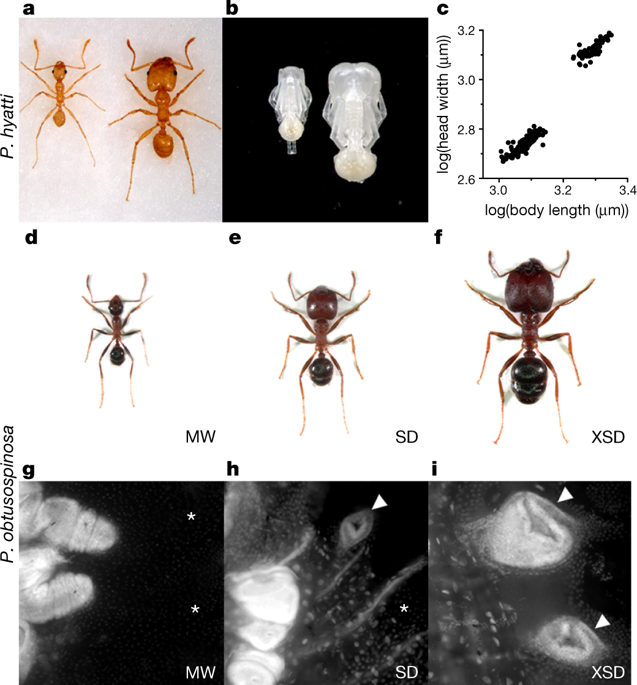Our official English website, www.x-mol.net, welcomes your
feedback! (Note: you will need to create a separate account there.)
Social regulation of a rudimentary organ generates complex worker-caste systems in ants
Nature ( IF 50.5 ) Pub Date : 2018-10-01 , DOI: 10.1038/s41586-018-0613-1 Rajendhran Rajakumar 1, 2 , Sophie Koch 1 , Mélanie Couture 1 , Marie-Julie Favé 1, 3 , Angelica Lillico-Ouachour 1 , Travis Chen 1 , Giovanna De Blasis 1 , Arjuna Rajakumar 1 , Dominic Ouellette 1 , Ehab Abouheif 1
Nature ( IF 50.5 ) Pub Date : 2018-10-01 , DOI: 10.1038/s41586-018-0613-1 Rajendhran Rajakumar 1, 2 , Sophie Koch 1 , Mélanie Couture 1 , Marie-Julie Favé 1, 3 , Angelica Lillico-Ouachour 1 , Travis Chen 1 , Giovanna De Blasis 1 , Arjuna Rajakumar 1 , Dominic Ouellette 1 , Ehab Abouheif 1
Affiliation

|
The origin of complex worker-caste systems in ants perplexed Darwin1 and has remained an enduring problem for evolutionary and developmental biology2–6. Ants originated approximately 150 million years ago, and produce colonies with winged queen and male castes as well as a wingless worker caste7. In the hyperdiverse genus Pheidole, the wingless worker caste has evolved into two morphologically distinct subcastes—small-headed minor workers and large-headed soldiers8. The wings of queens and males develop from populations of cells in larvae that are called wing imaginal discs7. Although minor workers and soldiers are wingless, vestiges or rudiments of wing imaginal discs appear transiently during soldier development7,9–11. Such rudimentary traits are phylogenetically widespread and are primarily used as evidence of common descent, yet their functional importance remains equivocal1,12–14. Here we show that the growth of rudimentary wing discs is necessary for regulating allometry—disproportionate scaling—between head and body size to generate large-headed soldiers in the genus Pheidole. We also show that Pheidole colonies have evolved the capacity to socially regulate the growth of rudimentary wing discs to control worker subcaste determination, which allows these colonies to maintain the ratio of minor workers to soldiers. Finally, we provide comparative and experimental evidence that suggests that rudimentary wing discs have facilitated the parallel evolution of complex worker-caste systems across the ants. More generally, rudimentary organs may unexpectedly acquire novel regulatory functions during development to facilitate adaptive evolution.In the ant genus Pheidole the growth of rudimentary wing discs—which influence developmental allometry to produce castes with distinct morphologies—is socially regulated to determine the worker-to-soldier ratio in Pheidole colonies.
中文翻译:

基本器官的社会调节在蚂蚁中产生了复杂的工种制度
蚂蚁中复杂的工蚁种姓系统的起源让达尔文感到困惑1,并且仍然是进化和发育生物学2-6的一个持久问题。蚂蚁起源于大约 1.5 亿年前,产生了有翼蚁后和雄性种姓以及无翼工蚁种姓的群体7。在高度多样化的 Pheidole 属中,无翅工蚁种姓已演化为两个形态上截然不同的亚种姓:小头的未成年工蚁和大头的士兵8。蜂王和雄蜂的翅膀是由幼虫中被称为翅成虫盘的细胞群发育而来。尽管未成年工人和士兵没有翅膀,但在士兵发育过程中,翼成盘的痕迹或雏形会短暂出现7,9-11。这些基本特征在系统发育上广泛存在,主要用作共同血统的证据,但它们的功能重要性仍然模棱两可1,12-14。在这里,我们表明,初级翼盘的生长对于调节头部和身体尺寸之间的异速生长(不成比例的缩放)是必要的,以产生大头的Pheidole属士兵。我们还表明,Pheidole 群体已经进化出社会调节初级翼盘生长的能力,以控制工人亚种姓的决定,这使得这些群体能够维持未成年工人与士兵的比例。最后,我们提供了比较和实验证据,表明初级翼盘促进了蚂蚁中复杂的工蚁系统的平行进化。更一般地说,初级器官在发育过程中可能会意外地获得新的调节功能,以促进适应性进化。在 Pheidole 蚂蚁属中,初级翼盘的生长(影响发育异速生长以产生具有不同形态的种姓)受到社会调节,以确定 Pheidole 蚁群中工兵与士兵的比例。
更新日期:2018-10-01
中文翻译:

基本器官的社会调节在蚂蚁中产生了复杂的工种制度
蚂蚁中复杂的工蚁种姓系统的起源让达尔文感到困惑1,并且仍然是进化和发育生物学2-6的一个持久问题。蚂蚁起源于大约 1.5 亿年前,产生了有翼蚁后和雄性种姓以及无翼工蚁种姓的群体7。在高度多样化的 Pheidole 属中,无翅工蚁种姓已演化为两个形态上截然不同的亚种姓:小头的未成年工蚁和大头的士兵8。蜂王和雄蜂的翅膀是由幼虫中被称为翅成虫盘的细胞群发育而来。尽管未成年工人和士兵没有翅膀,但在士兵发育过程中,翼成盘的痕迹或雏形会短暂出现7,9-11。这些基本特征在系统发育上广泛存在,主要用作共同血统的证据,但它们的功能重要性仍然模棱两可1,12-14。在这里,我们表明,初级翼盘的生长对于调节头部和身体尺寸之间的异速生长(不成比例的缩放)是必要的,以产生大头的Pheidole属士兵。我们还表明,Pheidole 群体已经进化出社会调节初级翼盘生长的能力,以控制工人亚种姓的决定,这使得这些群体能够维持未成年工人与士兵的比例。最后,我们提供了比较和实验证据,表明初级翼盘促进了蚂蚁中复杂的工蚁系统的平行进化。更一般地说,初级器官在发育过程中可能会意外地获得新的调节功能,以促进适应性进化。在 Pheidole 蚂蚁属中,初级翼盘的生长(影响发育异速生长以产生具有不同形态的种姓)受到社会调节,以确定 Pheidole 蚁群中工兵与士兵的比例。











































 京公网安备 11010802027423号
京公网安备 11010802027423号